(完整版)新人教版高中英语重点句式(附解释)
- 格式:doc
- 大小:57.01 KB
- 文档页数:5
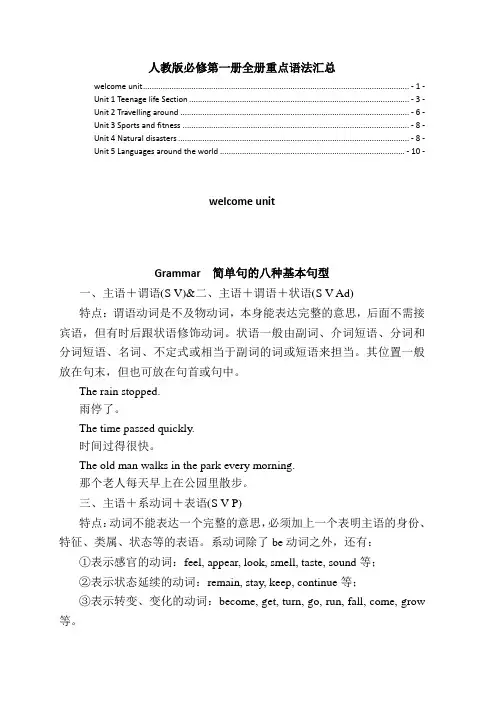
人教版必修第一册全册重点语法汇总welcome unit ......................................................................................................................... - 1 -Unit 1 Teenage life Section .................................................................................................... - 3 -Unit 2 Travelling around ........................................................................................................ - 6 -Unit 3 Sports and fitness ....................................................................................................... - 8 -Unit 4 Natural disasters ......................................................................................................... - 8 -Unit 5 Languages around the world .................................................................................... - 10 -welcome unitGrammar简单句的八种基本句型一、主语+谓语(S V)&二、主语+谓语+状语(S V Ad)特点:谓语动词是不及物动词,本身能表达完整的意思,后面不需接宾语,但有时后跟状语修饰动词。
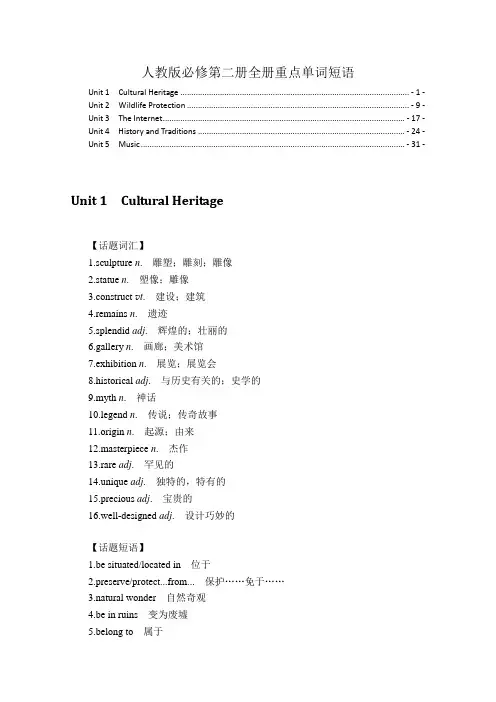
人教版必修第二册全册重点单词短语Unit 1Cultural Heritage ........................................................................................................ - 1 - Unit 2Wildlife Protection ..................................................................................................... - 9 - Unit 3The Internet .............................................................................................................. - 17 - Unit 4History and Traditions .............................................................................................. - 24 - Unit 5Music ........................................................................................................................ - 31 -Unit 1Cultural Heritage【话题词汇】1.sculpture n. 雕塑;雕刻;雕像2.statue n. 塑像;雕像3.construct v t. 建设;建筑4.remains n. 遗迹5.splendid adj. 辉煌的;壮丽的6.gallery n. 画廊;美术馆7.exhibition n. 展览;展览会8.historical adj. 与历史有关的;史学的9.myth n. 神话10.legend n. 传说;传奇故事11.origin n. 起源;由来12.masterpiece n. 杰作13.rare adj. 罕见的14.unique adj. 独特的,特有的15.precious adj. 宝贵的16.well-designed adj. 设计巧妙的【话题短语】1.be situated/located in 位于2.preserve/protect...from... 保护……免于……3.natural wonder 自然奇观4.be in ruins 变为废墟5.belong to 属于6.non-material cultural heritage 非物质文化遗产7.traditional crafts 传统工艺品8.be listed in 被列入9.folk arts 民间艺术10.The cradle of the civilization 文明的摇篮【话题佳句】1.History and culture are the soul of the city and people should cherish the city's historic and cultural heritage as their own lives.历史和文化是一个城市的灵魂,人们要像爱惜自己的生命一样珍惜城市历史文化遗产。
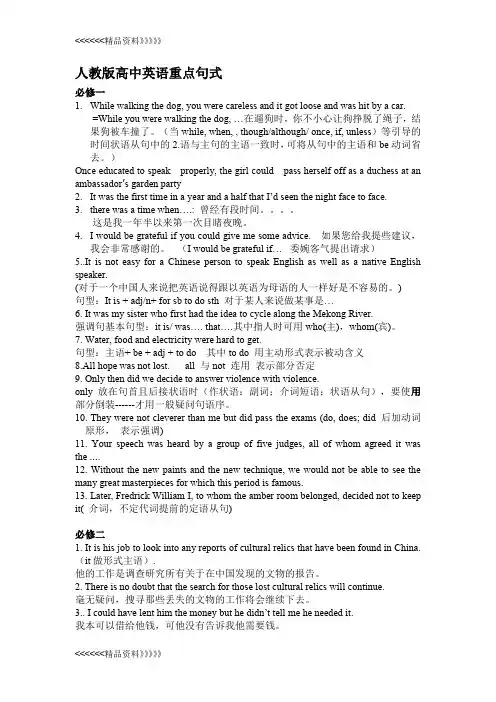
人教版高中英语重点句式必修一1.While walking the dog, you were careless and it got loose and was hit by a car.=While you were walking the dog, …在遛狗时,你不小心让狗挣脱了绳子,结果狗被车撞了。
(当while, when, , though/although/ once, if, unless)等引导的时间状语从句中的2.语与主句的主语一致时,可将从句中的主语和be动词省去。
)Once educated to speak properly, the girl could pass herself off as a duchess at an ambassador’s garden party2.It was the first time in a year and a half that I’d seen the night face to face.3.there was a time when….: 曾经有段时间。
这是我一年半以来第一次目睹夜晚。
4.I would be grateful if you could give me some advice. 如果您给我提些建议,我会非常感谢的。
(I would be grateful if…委婉客气提出请求)5..It is not easy for a Chinese person to speak English as well as a native English speaker.(对于一个中国人来说把英语说得跟以英语为母语的人一样好是不容易的。
)句型:It is + adj/n+ for sb to do sth 对于某人来说做某事是…6. It was my sister who first had the idea to cycle along the Mekong River.强调句基本句型:it is/ was…. that….其中指人时可用who(主),whom(宾)。
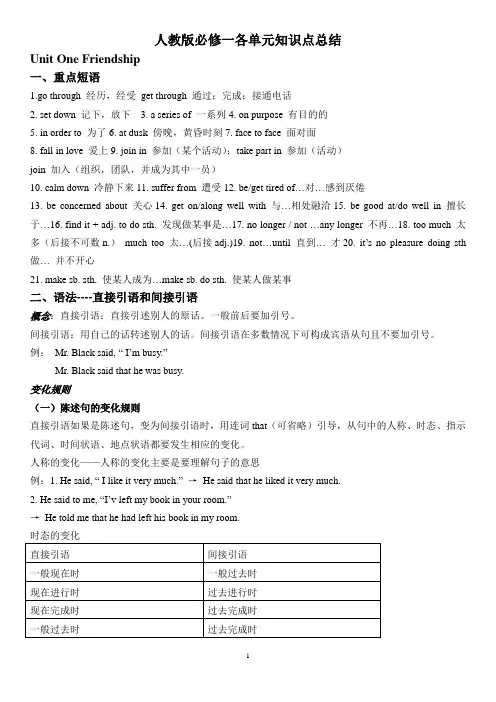
人教版必修一各单元知识点总结Unit One Friendship一、重点短语1.go through 经历,经受get through 通过;完成;接通电话2. set down 记下,放下3. a series of 一系列4. on purpose 有目的的5. in order to 为了6. at dusk 傍晚,黄昏时刻7. face to face 面对面8. fall in love 爱上9. join in 参加(某个活动);take part in 参加(活动)join 加入(组织,团队,并成为其中一员)10. calm down 冷静下来11. suffer from 遭受12. be/get tired of…对…感到厌倦13. be concerned about 关心14. get on/along well with 与…相处融洽15. be good at/do well in 擅长于…16. find it + adj. to do sth. 发现做某事是…17. no longer / not …any longer 不再…18. too much 太多(后接不可数n.)much too 太…(后接adj.)19. not…until 直到…才20. it’s no pleasure doing sth 做…并不开心21. make sb. sth. 使某人成为…make sb. do sth. 使某人做某事二、语法----直接引语和间接引语概念:直接引语:直接引述别人的原话。
一般前后要加引号。
间接引语:用自己的话转述别人的话。
间接引语在多数情况下可构成宾语从句且不要加引号。
例:Mr. Black said, “ I’m busy.”Mr. Black said that he was busy.变化规则(一)陈述句的变化规则直接引语如果是陈述句,变为间接引语时,用连词that(可省略)引导,从句中的人称、时态、指示代词、时间状语、地点状语都要发生相应的变化。
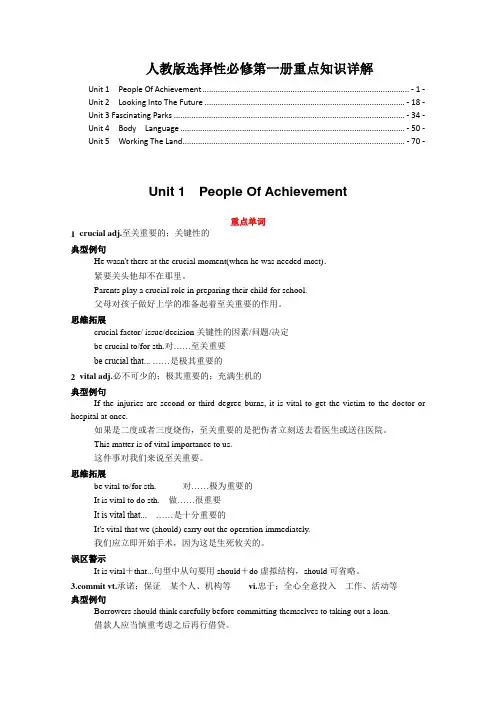
人教版选择性必修第一册重点知识详解Unit 1People Of Achievement .............................................................................................. - 1 - Unit 2Looking Into The Future ........................................................................................... - 18 - Unit 3 Fascinating Parks ......................................................................................................... - 34 - Unit 4Body Language ...................................................................................................... - 50 - Unit 5Working The Land ..................................................................................................... - 70 -Unit 1People Of Achievement重点单词1 crucial adj.至关重要的;关键性的典型例句He wasn't there at the crucial moment(when he was needed most).紧要关头他却不在那里。
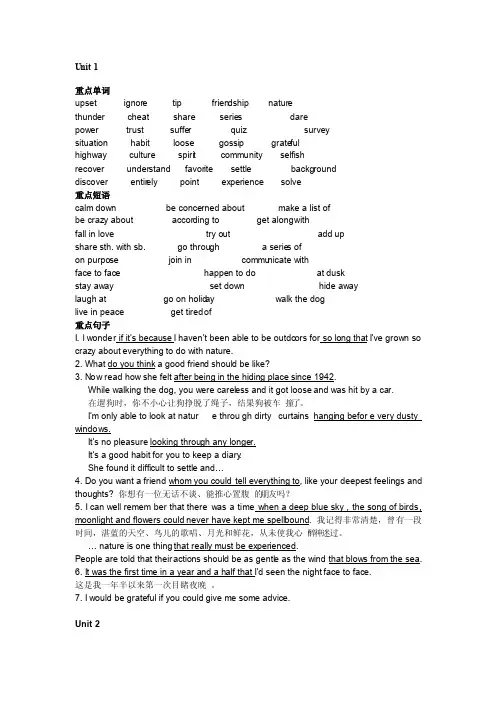
重点单词upset ignore tip friend ship naturethunde r cheat share series darepower trust suffer quiz surveysituat ion habit loose gossip gratef ulhighwa y cultur e spirit commun ity selfis hrecove r unders tand favori te settle backgr ounddiscov er entire ly point experi ence solve重点短语calm down be concer ned aboutmake a list ofbe crazyabout accord ing to get alongwithfall in love try out add upsharesth. with sb. go throug h a series ofon purpos e join in commun icate withface to face happen to do at duskstay away set down hide awaylaughat go on holida y walk the doglive in peace get tiredof重点句子I. I wonder ifit’sbecaus e I haven’tbeenabletobeoutdoo rs for so long that I’vegrownso crazyabouteveryt hingto do with nature.2. What do you thinka good friend should be like?3. Now read how she felt afterbeingin the hiding placesince1942.Whilewalkin g the dog, you were carele ss and it got looseand was hit by a car.在遛狗时,你不小心让狗挣脱了绳子,结果狗被车撞了。
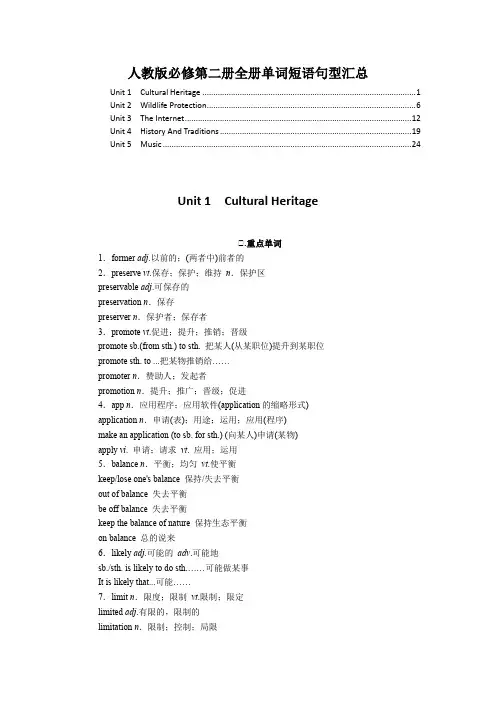
人教版必修第二册全册单词短语句型汇总Unit 1Cultural Heritage (1)Unit 2Wildlife Protection (6)Unit 3The Internet (12)Unit 4History And Traditions (19)Unit 5Music (24)Unit 1Cultural HeritageⅠ.重点单词1.former adj.以前的;(两者中)前者的2.preserve vt.保存;保护;维持n.保护区preservable adj.可保存的preservation n.保存preserver n.保护者;保存者3.promote vt.促进;提升;推销;晋级promote sb.(from sth.) to sth. 把某人(从某职位)提升到某职位promote sth. to ...把某物推销给……promoter n.赞助人;发起者promotion n.提升;推广;晋级;促进4.app n.应用程序;应用软件(application的缩略形式)application n.申请(表);用途;运用;应用(程序)make an application (to sb. for sth.) (向某人)申请(某物)apply vi. 申请;请求vt. 应用;运用5.balance n.平衡;均匀vt.使平衡keep/lose one's balance 保持/失去平衡out of balance 失去平衡be off balance 失去平衡keep the balance of nature 保持生态平衡on balance 总的说来6.likely adj.可能的adv.可能地sb./sth. is likely to do sth.……可能做某事It is likely that...可能……7.limit n.限度;限制vt.限制;限定limited adj.有限的,限制的limitation n.限制;控制;局限limit...to...把……限定在……范围之内within the limits of 限定在……范围之内set a limit to...对……规定限度within limits 在某种程度上;有一点限制8.prevent vt.阻止;阻碍;阻挠prevent sb./sth. from doing sth.制止(防止)某人(或某物)做某事(在现代英语中from常常可以省略,但在被动句中,from不能省略)stop sb./sth. from doing sth.(其中的from在主动句中可以省略)keep sb./sth. from doing sth.(其中的from不可省略)9.loss n.丧失;损失at a loss 不知所措;困惑blood loss 失血weight loss 体重减少job loss 失业10.contribution n.捐款;贡献;捐赠make contributions to对……做出贡献,相当于make a contribution tocontribute v.捐助;捐献;贡献出;投稿contribute to有助于;促使;导致11.within prep.&adv. 在(某段时间、距离或范围)之内within reach (=close enough to touch) 伸手可及within easy reach of (=close to) 离……很近within sight of sth. 能看到某物的近距离12.conduct n.行为;举止;管理方法vt.组织;安排;带领conductor n.售票员;(合唱队等的)指挥者conduct oneself well/badly(行为)表现好/差13.donate vt.(尤指向慈善机构)捐赠;赠送;献(血)donate...to...把……赠予……donate blood to a blood bank向血库献血donation n.捐赠;捐赠物,捐款give/make/present a donation to捐赠……send a donation to...把捐款寄往……donator捐赠者14.attempt n.& vt.企图;试图;尝试attempt to do sth.尝试/试图做某事at the/one's first attempt第一次尝试make/in an attempt to do sth.尝试/试图做某事make/in an attempt at(doing) sth.尝试/试图做某事15.worthwhile adj.值得做的;值得花时间的“值得做某事”的句型差别:It is worthwhile doing/to do sth.sth. is ⎩⎪⎨⎪⎧ worth doing worthy ⎩⎨⎧ of being done to be done16.entrance n .入口;进入entrance to sth.进入……的入口(门口)17.process n .过程;进程;步骤 vt .处理;加工18.forgive vt .&vi .原谅;宽恕 vt .对不起;请原谅forgive sb.(for) sth.原谅某人某事forgive doing sth.原谅做某事19.throughout prep .各处;遍及;自始至终20.quality n .质量;品质;素质;特征 adj .优质的;高质量的of ⎩⎪⎨⎪⎧good/high quality 质量好的;品质优秀的bad/poor quality 质量差的;品质低劣的 21.tradition n .传统;传统的信仰或风俗by tradition (=according to tradition) 根据传统(习俗)follow a tradition 遵循传统break with tradition 打破传统carry on the tradition 继承传统It is the tradition (for sb.) to do sth. 按照传统(某人)应该做某事22.opinion n .意见;想法;看法ask the opinion of sb. 征求某人的意见have a high/low/good/bad opinion of...对……评价高/低/好/差in one's opinion (=in the opinion of sb.) 就某人看来23.comparison n .比较;相比in comparison with 与……相比compare vt .比较;匹敌;比喻;相比 n .比较compare...with/to...把……和……相比较compare...to...把……比作……compared to/with...和……相比(通常作状语)compare notes with sb.与某人交换意见或看法beyond/without compare 无与伦比,举世无双Ⅰ.重点短语1.take part in 参与(某事);参加(某活动)2.give way to 让步;屈服give away 暴露(自己的情况);泄露(秘密);赠送;捐赠;颁发give back 归还;使恢复give in (to)屈服;让步;上交give off发出(光、热、气味等);散发give out分发;用完;耗尽;发出give up放弃;认输3.lead to导致lead sb. to/into sp.把某人带到……;领到某地lead sb.to引导某人……lead a/an...life过……的生活lead sb. to do sth.引导某人做某事lead the way引路,带路result in导致result from由……导致4.turn to向……求助turn against反对turn away回绝turn up调大;出现turn off关掉turn back往回走turn down关小;调低;拒绝turn in上交turn on接通;打开5.day and night日日夜夜地;整日整夜all day(long)一整天day after day(强调重复)日复一日地;天天day by day(强调变化)一天天地;逐日地one day(过去或将来的)某一天some day(将来)总有一天the other day前几天6.all over the world在世界各地after all毕竟,终究,归根结底above all 首先;最重要的是;特别是;尤其first of all “首先,第一”,强调顺序at all 根本,全然in all 总共,共计all in all 总之7.work on研究;致力于;从事于work out解决;制订;耗尽;带来好结果work at致力于out of work失业Ⅰ.重点句型1.By studying old photos of the former palace,they have made the new one look exactly like the old one.通过研究旧宫殿的照片,他们使新宫殿看起来几乎和旧的一样。
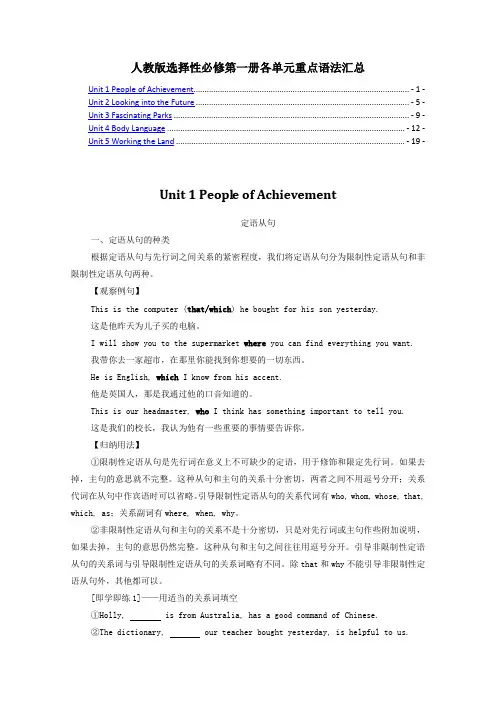
人教版选择性必修第一册各单元重点语法汇总Unit 1 People of Achievement.................................................................................................. - 1 - Unit 2 Looking into the Future ................................................................................................. - 5 - Unit 3 Fascinating Parks ........................................................................................................... - 9 - Unit 4 Body Language ............................................................................................................ - 12 - Unit 5 Working the Land ........................................................................................................ - 19 -Unit 1 Peopl e of Achievement定语从句一、定语从句的种类根据定语从句与先行词之间关系的紧密程度,我们将定语从句分为限制性定语从句和非限制性定语从句两种。
【观察例句】This is the computer (that/which) he bought for his son yesterday.这是他昨天为儿子买的电脑。
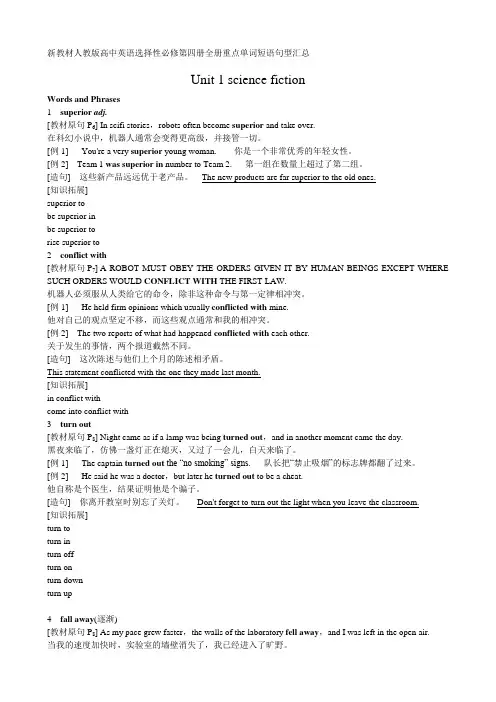
新教材人教版高中英语选择性必修第四册全册重点单词短语句型汇总Unit 1 science fictionWords and Phrases1superior adj. _______________________________________[教材原句P6] In scifi stories,robots often become superior and take over.在科幻小说中,机器人通常会变得更高级,并接管一切。
[例1]You're a very superior young woman. 你是一个非常优秀的年轻女性。
[例2]Team 1 was superior in number to Team 2. 第一组在数量上超过了第二组。
[造句]这些新产品远远优于老产品。
The new products are far superior to the old ones.[知识拓展]superior to _______________________________________be superior in _______________________________________be superior to _______________________________________rise superior to _______________________________________2conflict with_______________________________________[教材原句P7] A ROBOT MUST OBEY THE ORDERS GIVEN IT BY HUMAN BEINGS EXCEPT WHERE SUCH ORDERS WOULD CONFLICT WITH THE FIRST LAW.机器人必须服从人类给它的命令,除非这种命令与第一定律相冲突。
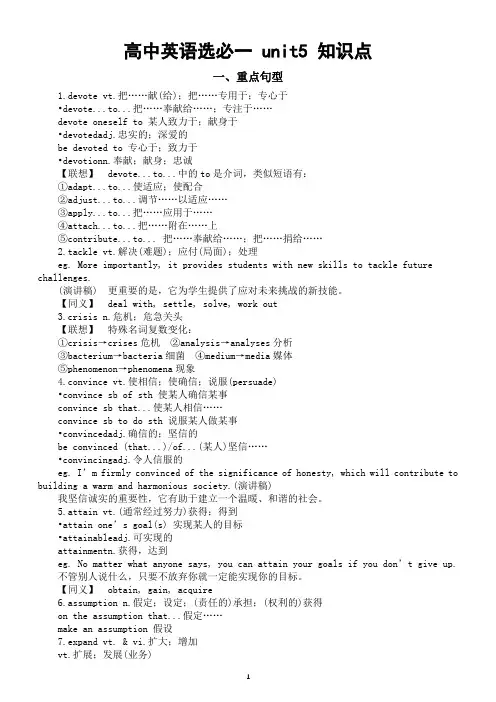
高中英语选必一 unit5 知识点一、重点句型1.devote vt.把……献(给);把……专用于;专心于•devote...to...把……奉献给……;专注于……devote oneself to 某人致力于;献身于•devotedadj.忠实的;深爱的be devoted to 专心于;致力于•devotionn.奉献;献身;忠诚【联想】devote...to...中的to是介词,类似短语有:①adapt...to...使适应;使配合②adjust...to...调节……以适应……③apply...to...把……应用于……④attach...to...把……附在……上⑤contribute...to... 把……奉献给……;把……捐给……2.tackle vt.解决(难题);应付(局面);处理eg. More importantly, it provides students with new skills to tackle future challenges.(演讲稿) 更重要的是,它为学生提供了应对未来挑战的新技能。
【同义】deal with, settle, solve, work out3.crisis n.危机;危急关头【联想】特殊名词复数变化:①crisis→crises危机②analysis→analyses分析③bacterium→bacteria细菌④medium→media媒体⑤phenomenon→phenomena现象4.convince vt.使相信;使确信;说服(persuade)•convince sb of sth 使某人确信某事convince sb that...使某人相信……convince sb to do sth 说服某人做某事•convincedadj.确信的;坚信的be convinced (that...)/of...(某人)坚信……•convincingadj.令人信服的eg. I’m firmly convinced of the significance of honesty, which will contribute to building a warm and harmonious society.(演讲稿)我坚信诚实的重要性,它有助于建立一个温暖、和谐的社会。
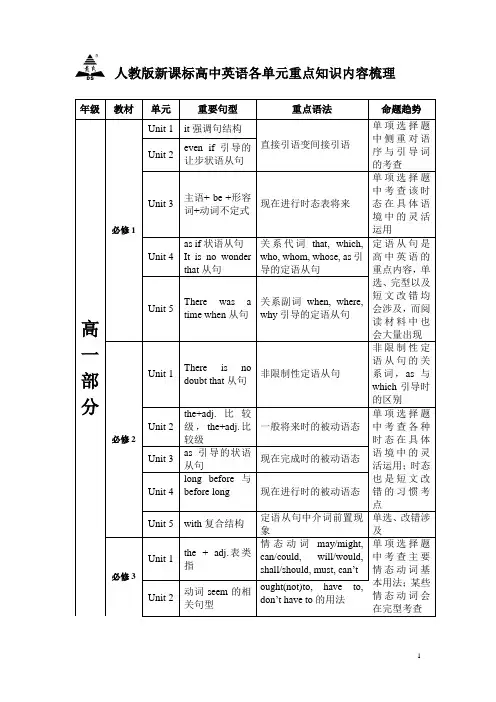
人教版新课标高中英语各单元重点知识内容梳理年级教材单元重要句型重点语法命题趋势高一部分必修1Unit 1 it强调句结构直接引语变间接引语单项选择题中侧重对语序与引导词的考查Unit 2even if引导的让步状语从句Unit 3主语+ be +形容词+动词不定式现在进行时态表将来单项选择题中考查该时态在具体语境中的灵活运用Unit 4as if状语从句It is no wonderthat从句关系代词that, which,who, whom, whose, as引导的定语从句定语从句是高中英语的重点内容,单选、完型以及短文改错均会涉及,而阅读材料中也会大量出现Unit 5There was atime when从句关系副词when, where,why引导的定语从句必修2Unit 1There is nodoubt that从句非限制性定语从句非限制性定语从句的关系词,as与which引导时的区别Unit 2the+adj.比较级,the+adj.比较级一般将来时的被动语态单项选择题中考查各种时态在具体语境中的灵活运用;时态也是短文改错的习惯考点Unit 3as引导的状语从句现在完成时的被动语态Unit 4long before与before long 现在进行时的被动语态Unit 5 with复合结构定语从句中介词前置现象单选、改错涉及必修3Unit 1the + adj.表类指情态动词may/might,can/could, will/would,shall/should, must, can’t单项选择题中考查主要情态动词基本用法;某些情态动词会在完型考查Unit 2动词seem的相关句型ought(not)to, have to,don’t have to的用法。
Unit 1.Friendship1.add up 合add up to ⋯共 ,?达 ? add⋯to 把⋯加在里面2.upset sb. 某人不安upset oneself about sth.某事而be upset at/about因⋯而3.ignore sb./sth.忽,不理会be ignorant of⋯ 无知,不了解4.calm down? 静 ,?平静calm sb. down使某人静keep calm保持静5.with concern? 关切地concern oneself with/ in参与,干涉be concerned with与⋯有关系be concerned about/ for sth. /that-clause⋯担心,挂念As far as ⋯ be concerned就某某而言concerning prep.?关于,有关6.walk the dog遛狗7.go through, 受;;仔8.set down.? 下,放下9.a series of? 一系列的 ,?一串的10.on purpose?故意地 = by design= deliberately?11.in order to/ so as to (do sth.)了 , 以⋯⋯目的12.at dusk? 在黄昏刻at dawn?在黎明分13.face to face面面地 (作状 )shoulder to shoulder?肩并肩地hand in hand?手拉手地heart to heart心地side by side并排地back to back背靠背地arm in arm臂挽臂地word by word逐字地14.settle down?定居下来,平静下来,舒适地坐下15.suffer from因⋯⋯而痛苦 ,?患⋯⋯病16.recover from illness生病后恢复17.get/be tired of⋯18.pack (sth.) up将(西)装箱打包19.get along / on with sb.与某人相get along / on with sth.某事展20.fall in love相,上21.join in sth. / doing sth.参加活22.have trouble / difficulty / problem with sb. / sth.和某人相/做某事有困have trouble / difficulty / problem (in) doing sth.做某事有困重点句子1.Your friend comes to school very upset.2.While walking the dog, you were careless and it got loose and was hit by a car.3. she and her family hid away for nearly twenty -five months before they were discovered.4.I wonder if it's because I haven't been able to be outdoors for so long that I've grown socrazy about everything to do with nature.5.I can well remember that there was a time when a deep blue sky, the songs of the birds,moonlight and flowers could never have kept me spellbound.6. It was the first time in a year and a half that I'd seen the night face to face⋯7.It ’ s no pleasure looking through these any longer because nature is one thing that really mustbe experienced8.There is nothing wrong with you and this boy being friends and studying together.9.I still find it hard to make good friends with them10.I would be grateful if you could give me some adviceunit 2.English around the world1.because of 因 (后接名 .代 .名性从句 )e up:走上前来;被提出;(太阳.月亮)升起;生3.base sth. on sth.使⋯⋯以⋯⋯依据/基be based on sth.?以⋯⋯依据/基4.?present sth. to sb./present sb. with sth.向某人送// 授予 / 介某物5.make use of利用;使用make full use of充分利用make good use of好好利用make little use of不充分利用make the best (use) of更好地利用;往好里做make the most of更好地利用6.such as:用于列,往往不能把事物全部列出7.?command sb. to do sth.命令某人做某事command (that) sb. (should) do sth.从句中用虚气under the command of sb.=under sb’ s command在⋯⋯的指下have a good command of English.精通/熟掌握英8.request sth. from sb.向某人索要某物request sb. to do sth.要求某人做某事request that sb. (should) do sth.It ’ s requested that从句据要求make a request for sth.要求/需要某物by request邀at sb ’ s request/at the request of sb.根据⋯的求9.play a part in在⋯⋯中担任角色/起作用play an important/vital part/role in (doing) sth.在⋯⋯中起重要/至关重要的作用play the leading role/part起主要作用,起作用,演主角10.make sense有道理;有意;得通11.hold on挂();持12.ask directions路give directions指路;予指示in the direction of朝⋯⋯方向in all directions = in every direction向四面八方13.put sth. down写下;下;14.have fun with sth.以⋯⋯重点句子11. Your friend comes to school very upset.12. While walking the dog, you were careless and it got loose and was hit by a car.13. she and her family hid away for nearly twenty -five months before they were discovered.14.I wonder if it's because I haven't been able to be outdoors for so long that I've grown socrazy about everything to do with nature.15.I can well remember that there was a time when a deep blue sky, the songs of the birds,moonlight and flowers could never have kept me spellbound.16. It was the first time in a year and a half that I'd seen the night face to face⋯17.It ’ s no pleasure looking through these any longer because nature is one thing that really mustbe experienced18.There is nothing wrong with you and this boy being friends and studying together.19.I still find it hard to make good friends with them20.I would be grateful if you could give me some adviceUnit 3.Travel journal1.?transport⋯(from⋯) to⋯ 把⋯从⋯运到⋯2.prefer doing to doing更喜干⋯⋯而不愿干⋯⋯prefer to do rather than do宁愿干⋯⋯而不愿干⋯⋯prefer sb to do sth.宁愿某人做某事prefer that sb (should) do更宁愿某人干⋯3.have a preference for⋯⋯⋯偏have no particular preference没有特的偏好3.ever since.从那以后4.?persuade sb. to do sth.=persuade sb. into doing sth.服某人做⋯⋯persuade sb. not to do=persuade sb. out of doing服某人停止做⋯⋯;阻某人做⋯⋯persuade sb. of sth.或persuade sb. + that从句使某人相信5.graduate from⋯从⋯⋯?graduate sb.授予某人学位或文凭6.ahead of schedule定的提前?on schedule按照定的,按behind schedule于定的;拖后be scheduled to do sth.定做某事7.be fond of (doing) sth.be into /crazy about (doing) sth.喜(做)某事;做某事感趣be interested in (doing) sth.anize sb. to do sth.某人干某事9.care about关心;;念care for喜;照10.determine to do决定做某事determine sb. to do sth.使某人决定做某事be determined that从句be determined to do sth决定干某事=make up one’ s mind to dowith determination决地11.go on/ make/ take a journey to sp.去某地旅行12.?at an altitude of =at a height of在⋯⋯高度at a price of以⋯⋯的价格at a speed/ rate of以⋯⋯速度at a length of在⋯⋯度at a depth/ width of在⋯⋯深度,度at a distance of在⋯⋯的距离at the cost of以⋯⋯代价13. read one’s mind看出某人心思keep one’ s mind on心于speak one’ s mind直言不bear/ keep sth. in mind住某事.光 .等)14.give in (to sb./ sth.) (向⋯⋯)屈服;步;投降give off出(蒸汽give out分;筋疲力尽give way to位于;妥15.at a good pace相当快地keep pace with跟⋯⋯步前16.take a friendly attitude to/ towards us.我采取友善的度hold a positive/ negative attitude持极/消极度17.as usual:照常18.at midnight在午夜at noon在正午19.flow through sp.流某地20.insist on (sb’ s) doing sth.决要求(某人)做21.go/ run like clockwork按划行;展利22.weather forecast天气23.be/ go out of view从野消失come into view入admire the view欣景色in my view = from my point of view依我看来take the view that从句,持有⋯⋯点view sb. as sth.把⋯⋯看作24.put up the tents.搭起篷put up your hands手put up the post海put up ten people for night十人提供食宿夜25.give my love/ best wishes to sb.代我向⋯⋯好/候重点句子21. Your friend comes to school very upset.22.While walking the dog, you were careless and it got loose and was hit by a car.23.she and her family hid away for nearly twenty -five months before they were discovered.24.I wonder if it's because I haven't been able to be outdoors for so long that I've grown socrazy about everything to do with nature.25.I can well remember that there was a time when a deep blue sky, the songs of the birds,moonlight and flowers could never have kept me spellbound.26. It was the first time in a year and a half that I'd seen the night face to face⋯27.It ’ s no pleasure looking through these any longer because nature is one thing that really mustbe experienced28.There is nothing wrong with you and this boy being friends and studying together.29.I still find it hard to make good friends with them30.I would be grateful if you could give me some adviceUnit 4.Earthquakes1.right/ straight away = at once立刻;上2.burst into a place=break into a place突然burst in突然插嘴;打断burst into tears/ laughters/ flames突然大哭/大笑/起火burst out crying/ laughing/ singing突然哭起来/笑起来/唱起来3.as if/ though仿佛;好像4.at an end束;in the end最后;于at the end (of sth.)在尾;在(⋯⋯)束的候by the end of this month在本月末5.be/ lie/ stand in ruins成一片墟the ruins of Yuanmingyuan明迹ruin one’ s health坏某人健康ruin one’ s hope使某人希望破7. keep track of;掌握⋯⋯的索8. rescue sb. from⋯从危中救出a rescue team救援come/ go to one’ s rescue救某人10.trap sb. in the mud= get/ be trapped in the mud被困在泥巴里面trap sb./ sth. into (doing)⋯使人/物(做)⋯⋯set a trap圈套11.dig out (dug dug)掘出;12.bury one’ s face/ head in sth.把/伸到⋯⋯里去bury oneself in= be buried in埋于;心于be buried in thought陷入了沉思13.build shelters for survivors幸存者建避所take shelter from the rain雨shelter me from blame保我免受14.judge sth. from/ by sth.由⋯⋯来判断judging from/ by sth.由⋯⋯来看(作状)judge sb. to be⋯某人⋯⋯As far as I can judge据我判断make a judgement on sth.⋯⋯作出判断15.express oneself表达自己express the letter用快方式寄出信件16.rise by 20%增了20%rise to 200增到200 rise from the chair从椅子上站起来ask for a rise要求工get a rise升;工17.run out of从⋯⋯跑出来;用光(不用被)18.think little/ nothing of;忽;think much/ highly of重;看重;⋯⋯高度价think of sb. as⋯把⋯⋯看作19.reach an agreement达成reach a conclusion得出reach him by telephone用与他取得系reach out for sth伸手去拿out of the reach of sb.在某人伸手不着的地方within the reach of sb.在某人伸手得着的地方above/ beyond the reach of sb.超出某人的能力20.in the open air在外21.honor sb. for sth.=be honored for sth.因某事而受到尊敬/ 表彰be/ feel honored to do sth.做某事感到荣幸It ’ s a great honor for sb. to do sth.做某事某人来很荣幸have the honor to do/ of doing sth.有做某事的荣幸do sb. an/the honor of doing(sth.)光in honor of sb.=in sb’ s honor向⋯⋯表示敬意;念⋯⋯22.the disaster-hit/stricken areas受灾地区重点句子31. Your friend comes to school very upset.32. While walking the dog, you were careless and it got loose and was hit by a car.33. she and her family hid away for nearly twenty -five months before they were discovered.34.I wonder if it's because I haven't been able to be outdoors for so long that I've grown socrazy about everything to do with nature.35.I can well remember that there was a time when a deep blue sky, the songs of the birds,moonlight and flowers could never have kept me spellbound.36. It was the first time in a year and a half that I'd seen the night face to face⋯37.It ’ s no pleasure looking through these any longer because nature is one thing that really mustbe experienced38.There is nothing wrong with you and this boy being friends and studying together.39.I still find it hard to make good friends with them40.I would be grateful if you could give me some adviceUnit 5.Nelson mandela-a modern hero1.be of high good/ low/ poor quality量高/低2.be active in⋯在⋯⋯方面很极/活take an active part in⋯极参与⋯⋯lead / live an active life着极的生活3.devote oneself to sth./ doing sth.献身于⋯⋯;心做某事devote one’s life/ time/ money/ energy to sth./ doing sth.?把本人的一生// 金/ 精力奉献于⋯⋯be devoted to⋯心致志于;忠于;喜4.in principle.原上;大致上stick to one’ s principles恪守自己的原on the principle of根据⋯⋯的原against one’ s principle背某人的原5.guidance on sth.某事物的指offer guidance to sb.某人提供指under/ with the guidance of sb. =under/ with sb’ s guidance在某人的指下6.out of work=out of a job失out of control失去控制out of patience失去耐心out of reach不着out of date out of sight看不out of money花光out of mind心不在焉out of order坏了;混乱7.vote on⋯就⋯⋯投票vote for/ against投票成 / 反vote to do投票表决帮某事;8.attack sb. from behind背后攻make an attack on/ against⋯攻;;抨under attack遭到 / 抨air attack空 a heart attack心病突9.as a matter of fact事上=in (actual) fact = actually10.blow up;使气;炸blow out吹blow down刮倒11.be equal to与⋯⋯相等;等于;能任equal sb in sth = be an equal to sb in sth.在某方面与某人匹/ 力相当equally adv.12.be in trouble在危;受;痛苦;等的境中ask for trouble自get into trouble遇到麻 ;出事have trouble (in) doing sth.做某事有困make trouble制造麻take great trouble to do sth不辞辛苦做某事13.turn to求助于;致力于;向;成;到14.lose heart失勇气或信心lose facelose weight减肥lose one’ s heart to上;喜上lose one’ s way迷路lose one’ s temper怒lose oneself in迷上 lose one ’ s sight 失明15.escape from..从⋯⋯逃跑 / 脱e to power当;上台17.beg sb. to do sth.乞求(某人)做某事beg sb. for sth.向某人要某西Beg your pardon原;再一遍18.reward sb. with sth.用⋯⋯酬某人in reward作酬reward sb. for (doing) sth.因⋯而酬某人as a reward for⋯作⋯⋯的酬()19.set out to do sth.开始干⋯⋯;着手于⋯ ...set out/ off for sp.身去某地set off 引爆,使⋯⋯爆炸,身set about doing sth开始干(做)某事20.be sentenced to被判⋯⋯(徒刑)21.have a good/ bad/ high/ low opinion of sb./ sth.⋯⋯ 价好 / 不好 / 高/ 低in one ’s opinion = in the opinion of sb.以⋯⋯看来22.fight a battle打仗fight for freedom争取自由而斗争fight against⋯⋯反⋯⋯而fight with⋯同⋯⋯斗争/同⋯⋯并肩作fight with sb. about⋯⋯因⋯⋯而和某人争吵23.be in prison坐牢(状)escape from prison越put/ throw sb. into prison把某人投24.be grateful to sb. for sth.因某事而感激某人25.achieve nothing一无所achieve success/ victory得成功/利achieve one’ s purpose/ goal达到目的achieve one’ s aim/dream目/梦想重点句子41. Your friend comes to school very upset.42. While walking the dog, you were careless and it got loose and was hit by a car.43. she and her family hid away for nearly twenty -five months before they were discovered.44.I wonder if it's because I haven't been able to be outdoors for so long that I've grown socrazy about everything to do with nature.45.I can well remember that there was a time when a deep blue sky, the songs of the birds,moonlight and flowers could never have kept me spellbound.46. It was the first time in a year and a half that I'd seen the night face to face⋯47.It ’ s no pleasure looking through these any longer because nature is one thing that really mustbe experienced48.There is nothing wrong with you and this boy being friends and studying together.49.I still find it hard to make good friends with them50.I would be grateful if you could give me some advice。
人教版必修第二册全册重点内容详解Unit 1Cultural Heritage ........................................................................................................ - 1 - Section ⅠListening and Speaking,Reading and Thinking ........................................ - 1 - Section ⅡDiscovering Useful Structures .................................................................. - 13 - Section ⅢListening and Talking,Reading for Writing ............................................. - 17 - Unit 2Wildlife Protection ................................................................................................... - 23 - Section ⅠListening and Speaking,Reading and Thinking ...................................... - 23 - Section ⅡDiscovering Useful Structures .................................................................. - 37 - Section ⅢListening and Talking,Reading for Writing ............................................. - 39 - Unit 3The Internet .............................................................................................................. - 45 - Section ⅠListening and Speaking,Reading and Thinking ...................................... - 45 - Section ⅡDiscovering Useful Structures .................................................................. - 57 - Section ⅢListening and Talking,Reading for Writing ............................................. - 59 - Unit 4History And Traditions .............................................................................................. - 68 - Section ⅠListening and Speaking,Reading and Thinking ...................................... - 68 - Section ⅡDiscovering Useful Structures .................................................................. - 81 - Section ⅢListening and Talking,Reading for Writing ............................................. - 84 - Unit 5Music ........................................................................................................................ - 93 - Section ⅠListening and Speaking,Reading and Thinking ...................................... - 93 - Section ⅡDiscovering Useful Structures ................................................................ - 100 - Section ⅢListening and Talking,Reading for Writing ........................................... - 104 -Unit 1Cultural HeritageSection ⅠListening and Speaking,Reading and Thinking重点单词1 former adj.以前的;两者中前者的[典型例句]The former Soviet Union consisted of fifteen union republics.前苏联由15个共和国组成。
人教版选择性必修第三册全册重点单词短语句型汇总Unit 1 Art (1)Unit 2 Healthy Lifestyle (10)Unit 3 Environmental Protection (19)Unit 4 Adversity And Courage (27)Unit 5 Poems (35)Unit 1 ArtWords and Phrases1[教材原句P2]In particular,his paintings are set apart from other paintings by their realistic human faces and deep emotional impact.尤其是他的绘画作品,更是以其逼真的人物面貌和深刻的情感冲击而从其他绘画作品中脱颖而出。
(1)in particular尤其;特别[例1] Why should he notice her car in particular?他为什么会特别注意到她的车?[例2] He loves science fiction in particular.他特别喜欢科幻小说。
[造句] 他的发言是泛指一般情况,不是针对某一个人的。
His statement refers to people in general,not to anyone in particular.[知识拓展]in particular=particularly 特别;尤其be particular about 对……挑剔;对……讲究be particular to... 为……所特有(2)set apart from使与众不同;使突出;使优于……[例1] Her clear and elegant writing sets her apart from other journalists.她的文章清丽典雅,比其他记者高出一筹。
[例2] His strong views about life set him apart from most other Americans.他有关生活的强烈观点,使他有别于大多数其他美国人。
人教新课标必修一英语重点句型及短语翻译带答案期末复习可用(写写帮推荐)第一篇:人教新课标必修一英语重点句型及短语翻译带答案期末复习可用(写写帮推荐)必修一课本翻译Book1 unit 11.他是一个小偷,因此他总是把自己藏起来,否则就会被警察抓到。
He is a thief so he always hides himself or he will be caught by policeman.2.每天我们不得不做一系列我们不愿意做的事情。
Everyday we have to do a series of things which we are unwilling to do.3.这是我第一次看见广州塔。
It is the first time that I have seen Guangzhou Tower.Book1 unit 21.为什么英语会随着时间的推移而改变呢?Why has English changed over time?2.事实上,语言的改变和发展是文化与文化相互交流的结果。
Actually, languages change and develop as the result of cultures communicating with each other.3.到16世纪末期为止,大约5到7百万人说英语,他们中的大部分住在英格兰(用定语从句)At the end of the 16th century, about five to seven million people spoke English, most of whom lived in England.4.在过去10年,这个偏远的小山村发生了巨大的变化。
Great changes took place in the small distant village in the past/last ten years.5.到1600’s为止,莎士比亚能够比以前利用更广泛的词汇。
人教版选择性必修第一册全册重点单词短语句型汇总Unit 1 People of Achievement...........................................................- 1 -Unit 2 Looking into the Future.........................................................- 14 -Unit 3 Fascinating Parks..................................................................- 21 -Unit 4 Body Language.....................................................................- 28 -Unit 5 Working the Land.................................................................- 44 -Unit 1 People of AchievementWords And Phrases1 circumstance n.[usually pl.]条件;环境;状况(教材P5)There is nothing we can do to help Linda.Her circumstances are beyond our control.我们帮不了琳达什么忙。
她的处境是我们无法控制的。
[例1] He was forced by circumstances to do this.他做这件事是为环境所迫。
[例2] There is one important circumstance you have not mentioned.还有一件重要的细节你没提到。
高中英语必修一知识点整理U1Teenager life【四会词汇】volunteer /debate/prefer/content/challenge/confusing/recommend/advanced/obviously/solution/focus/schedule/quitfluent/responsible...【词组】be addicted to /sign up (for)/focus on /attract sb.to sth.be scheduled to do sth./a solution to …/have/take responsibility forbe responsible for sb/It is obvious that…/in advance/advanced technology/recommend sb. as.../recommend sb. to do sthprefer to do…rather than do/........【句型句式】1.so that引导目的状语从句2.Studying hard isn't always fu n…动名词(短语)作主语时,谓语动词要用单数形式3.在it作形式主语的句子中,真正的主语可以是不定式(短语)、动名词(短语)或从句4.make+宾语+宾语补足语【语法】名词短语、形容词短语、副词短语U2 Travelling around【四会词汇】contact/apply /amazing /amazed /unique/destination/arrangement /extremely/narrow/accommodation /admire /official /comment//credit/request /visa/economic/transport hike/tomb /unearth...【词组】apply for /Check out/Other than /in my view/put up/put down/put offBe based on/Make up/Be requested to do/credit card/lose one’s sight/comment on arrange for sb. to do sth/be recognized as/admire sb.for( doing)sth/.make contact with sb....【句型句式】1.as引导的时间状语从句2.until作介词和连词的用法3.现在分词(短语)作结果状语4.which引导的非限制性定语从句【语法】现在进行时表示将来U3 Sports and fitness【四会词汇】fitness /event /ski /host /track /sweat/legend/honour/determination /injure compete /pretend/audience/error/positive/championship /negative/pressure/cheat/legendgraceful /rather ....【词组】make it/make a difference/even if/though、fair play/compare…with/fall apartIn honor of/ give up/in the way/ by the way /fall down /speak highly of sb.../.come along...【句型句式】1.提建议常用句型Why not do sth.?2.here/there/now/then引起的完全倒装句3. even if/though 引导让步状语从句【语法】反义疑问句U4 Natural Disasters【四会词汇】disasters/rescue/ damage /destroy/affect /shelter /crack /shockTrap/bury/revive/unify/context/supply/emergency // summary ...【词组】it strikes sb. that…某人突然想到/crash into撞到……上/as usual和往常一样as if似乎;好像;仿佛/the number of……的数量/nothing but只有……/blow…away把……刮走、in the open air露天;在户外/on hand现有(尤指帮助)/carry out执行过着……的生活、out of gratitude出于感激....【句型句式】1.as if/though 引导的从句2.Leave +宾语+宾补【语法】限定性定语从句--关系代词U5 Languages around the world【四会词汇】native/attitude/despite/based /variety/major /regard /appreciatestruggle /equal/demand /description /relate ...【词组】refer to提及/date back(to...)追溯(到……)/point of view 观点/the attitude to/towards ……对……的态度/pay attention to /be of great importance /be known for/lead to /be connected with /play a...role in /be senior to / compare...with...aside from ...【句型句式】1.This/That is/was a time when...这是一个……的时期2.no matter+特殊疑问词(如who/what/where/when等)”均可引导让步状语从句3.as 引导状语从句,意为“随着”4.the+比较级, the+比较级越……,就越……5.动词+疑问词+to do 结构【语法】关系副词when/where/why引导的定语从句高中英语必修二知识点整理U1 Culturalheritage【四会词汇】preserve,application,balance,protest,likely, limit,prevent,loss,contribution,issue,conduct,donate,disappear,attempt,worthwhile,professional,forgive,quality,comparison,contrast.....【词组】take part in, give way to, keep balance,lead to,make a proposal, turn to,prevent...from, donate...to...等【句型句式】as 引导状语从句Not only 倒装句It ‘s said/reported that ........【语法】限制性定语从句“介词+关系代词”结构引导的定语从句U2 wildlife protection【四会词汇】concern vt.使忧虑/intend/remind v. 提醒,使某人想起/measure n. & v.searchv. 寻找/immediately adv.立刻/species n.物种./extinction n.灭绝/habitat n.(动植物的)生活环境;栖息地/average n.平均数/authority n.官方;当权/reserve.....【词组】be concerned with ...与……有关/die out灭绝/intend to do/doing sth.打算做某事take measures (to do sth.)“采取措施(做某事/measure sb./sth. against sb./sth.将……与……作比较/a mass of/ masses of 大片的/adopt to 收养/on average平均/.aware of 意识到...【句型句式】1.that引导定语从句2.Only前置,句子进行部分倒装3.for作为并列连词表示原因,用来引出并列分句,解释说话人为什么会说前面的话【语法】现在进行时的被动语态If 引导的真实条件状语从句一般现在时的被动语态U3 The internet【四会词汇】blogger/stuck/privacy/troll/cyberbully/embarrassing/define/blog/blog postChat/search engine/software/network/surf/charity/province/resident/ batteryButton/click/file/database/guideline....【词组】the global village/ raise money/online safety/ go through/a search engine/ a fitness planstream movies copy the file/look up information/ take steps/a nonsense name /bank accountthe key information get in shape/follow the rules/ stay safe/catch one’s attention /a thing or twowait in line/give out/develop an illness/ make trouble....【句型句式】“now that”经常用于句首,表示提醒他人注意,翻译成“因为”no matter+特殊疑问词”形成的连词可以引导让步状语从句【语法】现在完成时的被动语态U4 History and traditions【四会词汇】county/snack/roll/pub/wine/beer/military/landscape /cattle/nearby/oceanMansion/cemetery/descendant/heel/chief/puzzle/currency/conquer/fascinating/court yard/feastDot/roar/scent/stew/sensory/striking/Transition.....【词组】well-organized很有条理的/break away from摆脱,脱离/historic buildings历史建筑take over/接管/cultural traditions文化传统/as well as也,和/a scent of一种…味道keep your eyes open关注/as to至于/date back to 追溯到/through the history在历史上get charged充电/chief advantages主要优点/The amount of …的数量........【句型句式】“it”做形式主语,“to do”不定式做真正主语的句式结构过去分词,作为修饰语,起补充说明作用【语法】过去分词作定语和定语补足语U5 Music【四会词汇】composition/virtual/opportunity/enable/original/previous/phenomenon/Capable/relief/impact/aim/assume/addition/satisfaction/various/....【词组】absorbed in sth/ set sth up /fall in love 爱上/reflect on认真思考/be aimed to do sth. 目标在于/in addition to 除…之外/heart and soul 全心全意地/enable sb, to do sth.使某人能够做某事/in reaction to sth. 对…的反应/be equipped with 配有/have animpact\effect\influence on/...【句型句式】As it turned out,....../As is mentioned above,....It’s my honour to.......【语法】过去分词作表语和状语。
人教版高中英语重点句式必修一1.While walking the dog, you were careless and it got loose and was hit by a car.=While you were walking the dog, …在遛狗时,你不小心让狗挣脱了绳子,结果狗被车撞了。
(当while, when, , though/although/ once, if, unless)等引导的时间状语从句中的2.语与主句的主语一致时,可将从句中的主语和be动词省去。
)Once educated to speak properly, the girl could pass herself off as a duchess at an ambassador’s garden party2.It was the first time in a year and a half that I’d seen the night face to face.3.there was a time when….: 曾经有段时间。
这是我一年半以来第一次目睹夜晚。
4.I would be grateful if you could give me some advice. 如果您给我提些建议,我会非常感谢的。
(I would be grateful if…委婉客气提出请求)5..It is not easy for a Chinese person to speak English as well as a native English speaker.(对于一个中国人来说把英语说得跟以英语为母语的人一样好是不容易的。
)句型:It is + adj/n+ for sb to do sth 对于某人来说做某事是…6. It was my sister who first had the idea to cycle along the Mekong River.强调句基本句型:it is/ was…. that….其中指人时可用who(主),whom(宾)。
7. Water, food and electricity were hard to get.句型:主语+ be + adj + to do 其中to do 用主动形式表示被动含义8.All hope was not lost. all 与not 连用表示部分否定9. Only then did we decide to answer violence with violence.only 放在句首且后接状语时(作状语:副词;介词短语;状语从句),要使用部分倒装------才用一般疑问句语序。
10. They were not cleverer than me but did pass the exams (do, does; did 后加动词原形,表示强调)11. Your speech was heard by a group of five judges, all of whom agreed it was the ….12. Without the new paints and the new technique, we would not be able to see the many great masterpieces for which this period is famous.13. Later, Fredrick William I, to whom the amber room belonged, decided not to keep it( 介词,不定代词提前的定语从句)必修二1. It is his job to look into any reports of cultural relics that have been found in China.(it做形式主语).他的工作是调查研究所有关于在中国发现的文物的报告。
2. There is no doubt that the search for those lost cultural relics will continue.毫无疑问,搜寻那些丢失的文物的工作将会继续下去。
3.. I could have lent him the money but he didn’t tell me he needed it.我本可以借给他钱,可他没有告诉我他需要钱。
6. It has been proved that pride goes before a fall.事实证明骄必败。
(it作形式主语)7. What he had reasoned about the theory proved (to be) true.他对该原理的推理证明是正确的。
(主语从句)8. With the help of computer, you may not find it hard to deal with and share information. (it做形式宾语)在电脑的帮助下,你会发现处理和分享信息是不难的。
9.The tour companies applied to be allowed to hunt some for a fee, which made a lot of money for the farmers. (非限制性定语从句).10. They put an advertisement in a newspaper looking for rock musicians. (现在分词做状语).他们在报纸登了广告,想招摇滚乐手。
必修三1.The country, covered with cherry tree flowers, looks forward to the end of winterand to the coming of spring.(过去分词作后置定语)2.It’s obvious that the manager of the coffee shop was waiting …..(it作形式主语)3.Dressed in the finest clothes, he drove by the brothers’ house in Portland Place,and, seeing they were back, went to get Portia at …..(过去分词作状语)4.It’s well-known that Americans like to eat a lot(it作形式主语)5.I found myself carried out to sea by a strange wind.(过去分词作宾语补足语)6.Nothing could be better.7.He couldn’t have Yonghui getting away with telling people lies.8.The next morning I’d just about given myself up for lost when I was spotted by aship.9.He was studying in his study when he heard a screaming10.It’s so wet there that the trees are extremely tall, some measuring over 90 meters.(so…that…结构)必修四1.Only after her mother came to help her for the first few months was she allowed to begin her project.(倒装句)2.Watching a family of chimps wake up is our first activity of the day.(动名词作主语)3.You may find it astonishing that Charlie was ….(it作形式宾语)4.Unfortunately his father died, leaving the family ever worse off.(现在分词作状语)5.Not all cultures greet each other the same way, Nor are they comfortable in the same way with touching or distance between people.(倒装句)6.To enter a world of fantasy about ancient England, come to Camelot Park!(不定式作状语)7. Some festivals are held to honor the dead or to satisfy the ancestors, who might either to help or to do harm. ( either….or….引导并列结构)必修五1.He was so absorbed in a book that he did not hear the bell.(so…that…结构)2.It took them two years to construct the bridge.3.The new school is still under construction.4.The only way to conquer English is to practice constantly!5.Instead of throwing away the rubbish, why not recycle it?6.The questions put forward at the meeting are of vital importance.(定语从句)7.As teachers, you must believe that you can make a difference to the lives ofyour students.(宾语从句)选修六1.If the rules of perspective had not been discovered, people would not have been able to paint such realistic pictures.如果没有发现透视法,人们就不可能画出如此逼真的画.2. When people first saw his paintings they were convinced they were looking through a hole in the wall at a real scene.当人们第一次看到他的画时,他们确信他们是从墙上的一个孔看一个真实的场面.3. Nowadays, there are scores of modern art styles, but without the impressionists many of these painting styles would not exist.如今,现代艺术风格已经有好几十种,然而如果没有印象派,那么这许多不同的风格就不可能存在。